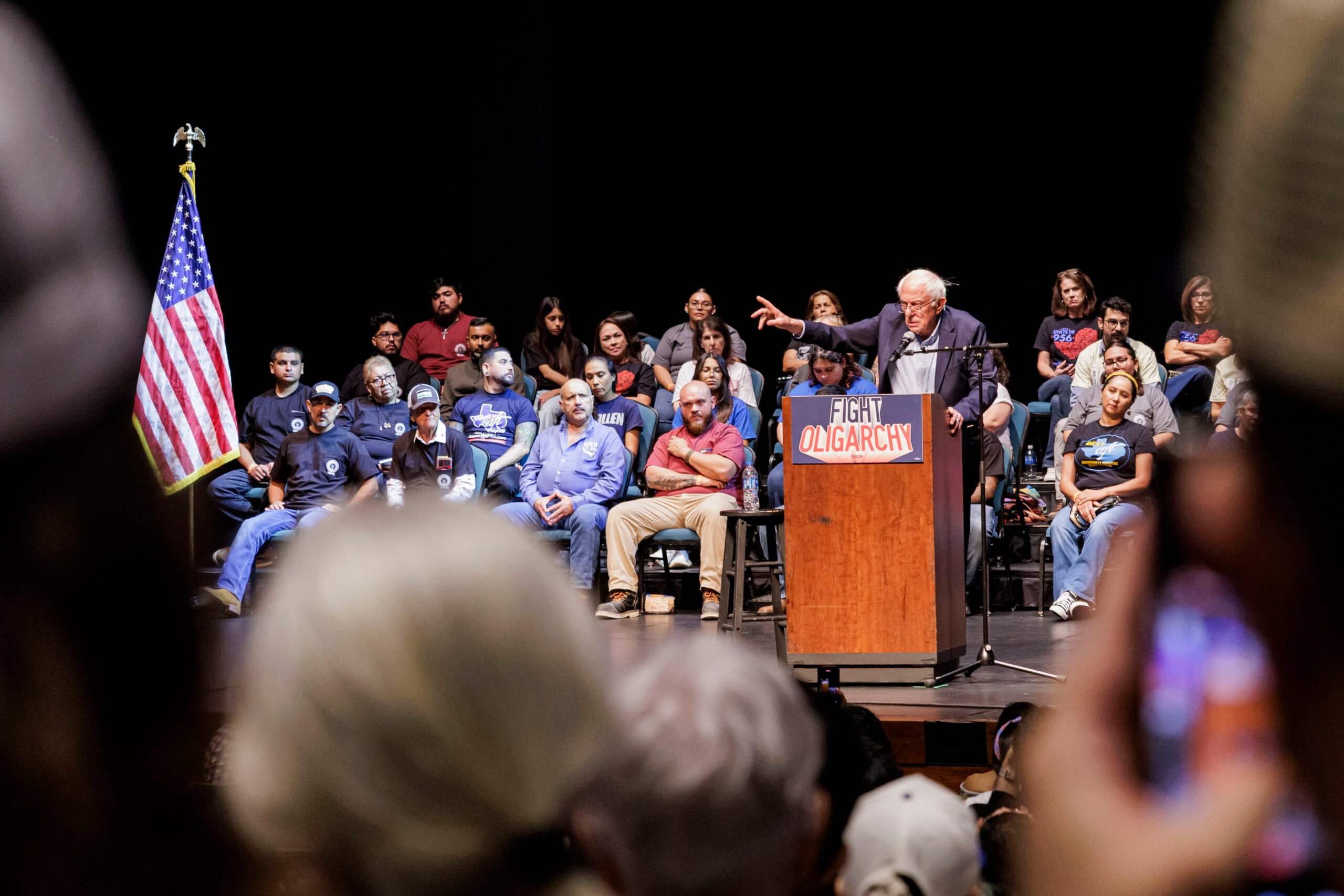Dateline Texas
Good grades, no papers in the Valley
On this clear, warm Saturday evening at Edcouch-Elsa High School in the Rio Grande Valley some 300 students, dressed in caps and gowns, are seated on the football field waiting for their diplomas. Black gowns for the young men, yellow for the young women and pure white for the top 10 seniors who lead their classmates into the stadium. Among the white gowns, I can easily spot Rosalinda and Edyael, two undocumented immigrant seniors who have spent the last months struggling to find a way to college. They sit proudly and expectantly in front, giving a small wave and a smile when someone calls out their name. In the bleachers, a thousand or so family members, friends and neighbors wait for the band to warm up and the speeches to begin.
Edcouch-Elsa High School is located on Highway 107, 12 miles from Progreso and the Mexican border. Many of these students will be the first in their family to finish high school; many began school here speaking only Spanish. Tonight the valedictorian and the salutatorian will use Spanish to thank their mothers, their extended families and their teachers. They will speak in English to acknowledge the school board and to quote from Dr. Seuss’ Oh, The Places You’ll Go.
At Edcouch-Elsa High School, top seniors routinely go to places like Yale, Brown, Columbia, MIT, UT, and Trinity. This year’s class is no exception. But several top students are not so fortunate. Despite their qualifications and ambition, they are cautiously figuring out how to get to UT-Pan Am in Edinburg or considering sitting out a year or two. What differentiates them from their peers is their immigration status–they are neither U.S. citizens nor permanent residents.
“It’s not fair,” Rosalinda* tells me. “Just because I don’t have documents. All my friends are saying, ‘I got into Columbia.’ ‘I got a full scholarship.’ That’s what I should be saying and yet I can’t.”
Eight years ago Rosalinda came across the Rio Grande River from Mexico, pulled in an inner tube by her father. Her family lived in a friend’s garage for two years, cooking outside, before they could afford to rent a place of their own. She learned English in the fourth grade and over the next eight years quickly moved to the top of her class. Throughout high school she took Advanced Placement classes and got straight A’s. “I wanted to go to an Ivy League school,” she says. “Yale said ‘No.’ I think it was because of my status.”
When Edyael Casaperalta was 12, she fled Mexico with her mother and younger sister because her father was threatening and stalking the family. They crossed illegally near Mercedes. “All I had,” she remembers, “was three sets of clothes, a little notebook and a dictionary.” Her mother, who spoke no English and had only completed sixth grade, found a job as a waitress. She met and married a US citizen; three years ago Edyael’s stepfather petitioned for permanent residency for his wife and her children, but they are still waiting. “My parents told me ‘If you ever flunk a class we’re going to send you to the street to sell candy,” Edyael says laughing. She never got less than an A- in high school. Last year, her courses included calculus, physics and Advanced Placement History.
“I lost weight because I was under so much stress,” she says. Ambitious and determined, Edyael went on what she calls “the Ivy League trip.”
“I was really excited about Harvard and Princeton. I would have applied to all the Ivy Leagues to see which one gave me the most money!” But she didn’t because she knew there was no chance. “It’s heartbreaking,” she says, “to know that you worked so hard and you are right there and ‘oops’ – you can’t go.”
I n 1982 the U.S. Supreme Court ruled that undocumented children are entitled to access to public education, striking down a Texas statute. There are no accurate figures for the number of undocumented students enrolled in the public school system, but in 1998, the Texas Education Agency reported that 300,000 of the 3.5 million students enrolled did not provide Social Security numbers–one indication that they were undocumented. In Edcouch-Elsa, school officials estimate that 300 of the 1,200 students currently enrolled in the high school are undocumented. In the class of 2001, six of the top 15 students were undocumented.
When it came time for them to apply to college, they were caught in legal limbo. Technically, they can’t be denied admission because of their status since admission is based on merit without consideration of immigration status. But there is really no correct box on the college applications for them to check. They may have lived on the U.S. side of the border for most of their lives, but they aren’t U.S. citizens or permanent residents, nor are they “international” students, even though the state universities have considered them as such, requiring them to pay international or out-of-state rates. Out-of-state tuition and fees alone easily top $5,000 per semester at UT-Austin.
“These students are in the worst of all possible situations,” says Kitty Villa, assistant director of UT-Austin’s International Office. “They don’t qualify for in-state tuition, they can’t work on campus, and there is no financial assistance available.” As Villa explains, students who have applications pending or intend to apply for permanent residency status, can’t then turn around and try to apply for an F-1 visa as international students. “They definitely can’t get a student visa,” she says. “They are intended immigrants, not students.” Undocumented, caught up in a Catch-22, they cannot receive federal grants, subsidized loans or participate in college Work/Study programs.
The INS customarily does not send the Border Patrol to schools or churches to find undocumented immigrants, but colleges and universities are aware that in the long term the INS would like them to be held more accountable. The INS can request information on an individual student’s status and the institution is required to provide it. “We have an obligation to keep students ‘in status,'” Mark Moody, international student admission officer at Trinity University, explains. Just what “in status” means to a student who currently has no legal status, who may be somewhere in INS proceedings, and who is definitely ineligible for a student visa is hard to tell.
This legislative session Representa-tive Rick Noriega (D-Houston) introduced HB 1403, a bill to change immigrants’ financial prospects at public institutions in Texas. Noriega and his staff were moved to action by the plight of one of his constituents, Rosendo Ticas, from El Salvador. A few years ago, Ticas, a successful small businessman, received his GED and wanted to go to college for a degree in aviation mechanics. But without either permanent residency or citizenship he found all the doors closed. Noriega helped him get into a community college and began to work on legislative reform.
Noriega’s bill won’t open the doors to MIT or Columbia, but it does provide a modest reform. The bill recently passed the House and Senate and is awaiting Governor Perry’s signature. The final bill states that if a student has resided in Texas for three years, graduated from a Texas high school or received a GED, and has (or intends to have) an application “in process” with the INS, then the student qualifies for in-state tuition.
Earlier this spring, legislators listened to the compelling testimony of a young man from Dallas who found himself trapped in the Catch-22: “I was in the top five percent of my senior class. I had a 4.11 GPA. I still couldn’t have a chance to go to college,” Alem Tewolderberhan told the House committee hearing, his voice choked with emotion. An Ethiopian immigrant who has been living in Dallas since he was five years old, Alem told the committee that through the efforts of friends and a scholarship, he is now attending college. He has a 4.0 GPA in his first semester and plans to become a doctor and work in a county hospital.
“All these other students,” he told the legislators, “could be doing the same thing. You should also give them a chance. Because they deserve it.”
Other students from around the state poured out their stories. All of them had applications for permanent residency pending, all had been sponsored by a family member who has either citizenship or permanent residency.
“I’ve worked as a housekeeper for $50 a week and as a waitress for $2.50 an hour,” Maria Bautista, a senior at Edcouch-Elsa explained. “I believe I have the potential to go beyond this. I don’t want to be doing this for the rest of my life.” Her sister, Olivia Bautista, also testified that she had worked and paid taxes. She said, “If we are able to achieve a good career in the United States we will be paying higher taxes than if we work as a waitress or a janitor. All of our knowledge and wisdom does not deserve to be wasted at some meatpacking company–I’ve done that–or in the fields. We have the ability to serve the nation at a higher level.”
Indeed, the economic argument for HB 1403 and similar reforms is powerful. A recent report by the University of Texas Board of Regents predicts the continued rapid growth of the Hispanic population, a group that has in the past been over-represented in numbers of high school dropouts and under-represented in numbers of college graduates. If these trends continue, the report concludes, Texas will find itself with a steep drop in per capita income and a shrinking tax base.
At graduation night in Edcouch-Elsa, thoughts of legislative testimony and the labyrinth of college applications seem far away. Restless seniors in the stadium have blown up a beach ball. The wind is strong and although they try to keep the ball in the air above their heads, it flies out across the field; a school official follows in hot pursuit. At long last the ceremony begins, and the top 10 students solemnly line up for special commendations and the superintendent calls out each of their college destinations. He says that Rosalinda and Edyael are going to Pan Am, Yale, UT-Austin, St. Mary’s, Brown and Baylor complete the list.
Then the rest of the graduating class files forward in alphabetical order. They step confidently up on the small Astroturf stage while their supporters in the stands yell and struggle to get a picture.
After the ceremony, I catch up with Rosalinda, who says that she is happy and proud. Her mother tells me that they heard from the INS last week and it looks like they are one step closer to permanent residency. I ask her again about her college plans. If she gets her green card this year, will she think about transferring to another school? She gives a quizzical look and then says with finality, “I don’t want to make any plans and then have things not go right.”
Belle Zars is a writer in San Antonio.



